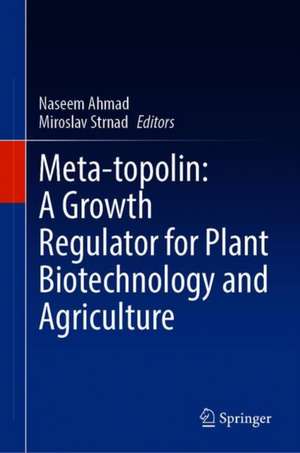Meta-topolin: A Growth Regulator for Plant Biotechnology and Agriculture
Editat de Naseem Ahmad, Miroslav Strnaden Limba Engleză Hardback – 3 mai 2021
| Toate formatele și edițiile | Preț | Express |
|---|---|---|
| Paperback (1) | 946.81 lei 39-44 zile | |
| Springer Nature Singapore – 3 mai 2022 | 946.81 lei 39-44 zile | |
| Hardback (1) | 1116.71 lei 6-8 săpt. | |
| Springer Nature Singapore – 3 mai 2021 | 1116.71 lei 6-8 săpt. |
Preț: 1116.71 lei
Preț vechi: 1361.84 lei
-18% Nou
Puncte Express: 1675
Preț estimativ în valută:
213.71€ • 222.83$ • 177.61£
213.71€ • 222.83$ • 177.61£
Carte tipărită la comandă
Livrare economică 20 martie-03 aprilie
Preluare comenzi: 021 569.72.76
Specificații
ISBN-13: 9789811590450
ISBN-10: 9811590451
Ilustrații: XIII, 339 p. 42 illus., 18 illus. in color.
Dimensiuni: 155 x 235 mm
Greutate: 0.67 kg
Ediția:1st ed. 2021
Editura: Springer Nature Singapore
Colecția Springer
Locul publicării:Singapore, Singapore
ISBN-10: 9811590451
Ilustrații: XIII, 339 p. 42 illus., 18 illus. in color.
Dimensiuni: 155 x 235 mm
Greutate: 0.67 kg
Ediția:1st ed. 2021
Editura: Springer Nature Singapore
Colecția Springer
Locul publicării:Singapore, Singapore
Cuprins
Chapter 1. History of meta-topolin and the aromatic cytokinins.- Chapter 2. Synthesis and chemistry of meta-topolin and related compounds.- Chapter 3. Cytokinin properties of meta-topolin and related substances.- Chapter 4. Occurrence, interconversion and perception of topolins in poplar.- Chapter 5. Cytokinin signalling and mechanism of action of meta-topolin and its derivatives.- Chapter 6. Determination of meta-topolin and the aromatic cytokinins.- Chapter 7. Topolin metabolism and its implications for in vitro plant micropropagation.- Chapter 8. Effect of meta-topolins on senescence.- Chapter 9. Effect of aromatic cytokinins on senescence-induced alterations in photosynthesis.- Chapter 10. Meta-topolin derived cytokinins as a solution to some in vitro problems.- Chapter 11. The role of meta-topolin in plant morphogenesis in vitro.- Chapter 12. Meta-topolin: advantages and disadvantages for in vitro propagation.- Chapter 13. Role of meta-topolin on in vitro shoot regeneration:an insight.- Chapter 14. Meta-topolin “an aromatic cytokinin” promotes improved micropropagation, rhizogenesis and ex vitro establishment of an India Ipeca (Tylophora indica Burm f.).- Chapter 15. Use of meta-topolin in somatic embryogenesis.- Chapter 16. Meta-topolins: in vitro responses and applications in large-scale micropropagation of horticultural crops.- Chapter 17. Optimization of micropropagation of some woody plants using meta-topolin.- Chapter 18. Biotechnological application of meta-topolin as highly active aromatic cytokinin in micropropagation of medicinal plants.- Chapter 19. The use of the meta-topolin in tissue culture for increasing production of secondary metabolites.- Chapter 20. Effects of meta-topolin on the growth, physiological and biochemical parameters in plant tissue culture.- Chapter 21. Establishment and management of an in vitro repository of kiwifruit (Actinidia spp.) germplasm.-Chapter 22. New generation of inhibitors of cytokinin oxidase/dehydrogenase from Arabidopsis thaliana affects shoot/root growth and seed yield.- Chapter 23. Topolins and related compounds and their use in agricultural applications.- Chapter 24. The pharmacological activity of topolins and their ribosides.
Notă biografică
Dr. Naseem Ahmad is working as Assistant Professor in the D/o Botany, Aligarh Muslim University, Aligarh. He has also worked as a Young Scientist and has more than 10 years of experience in Plant Tissue Culture and Molecular Biology. Published about 44 research papers, 02 edited Books entitled “Plant Tissue Culture:Propagation, Conservation and Crop Improvement” (Springer;2016); Thidiazuron: From Urea Derivative to Plant Growth Regulator (Springer, 2018). He holds Life Membership of many Learned/ Scientific Societies and is a fellow of Indian Botanical Society (FBS). He is recipient of “Yuva Vaigiyanik Samman (2009), CST, UP; Young Scientist (2010) by NESA, N. Delhi, Rashtriya Gaurav Award (2015) by IIFS, N. Delhi, Young Scientist (2015) by IFEE, Kolkata and Prof. Hira Lal Chakravarty Award (2019) by ISCA, Kolkata (India). He was also a Senior Research Fellow (SRF) of CSIR, N. Delhi.
Prof. Miroslav Strnad is head in the joined Laboratory of Growth Regulators, Institute of Experimental Botany of the Czech Academy of Sciences & Palacký University in Olomouc, Czech Republic (rustreg.upol.cz). Strnad’s current focus is on the research and development of a new generation of compounds with anti-viral, anti-proliferative, anti-angiogenic and anti-senescence properties, the molecular mechanisms of their action and the potential combinatory therapies based on these compounds, new phytohormone derived cosmetic as well as plant growth regulators for plant biotechnology and agriculture. He graduated in Phytotechnology from the Faculty of Agronomy, Mendel University, Brno, in 1982 (Ing.). In 2^ 12 500; Hirsch index: 56). He was PSE president (2014-2016), since 2018 vice-president.
Textul de pe ultima copertă
Plant tissue culture (PTC) technology has gained unassailable success for its various commercial and research applications in plant sciences. Plant growth regulators (PGRs) are an essential part of any plant tissue culture intervention for propagation or modification of plants. A wide range of PGRs are available, including aromatic compounds that show cytokinin activities, promote cell division and micro-propagation, viz. kinetin, N6-benzyladenine and topolins. Topolins are naturally occurring aromatic compounds that have gained popularity as an effective alternative for other frequently used cytokinins in in vitro culture of plants. Among them, meta-topolin [6-(3-hydroxybenzlyamino) purine] is the most popular and its use in plant tissue culture has amplified swiftly. During the last few decades, there have been numerous reports highlighting the effectiveness of meta-topolin in micropropagation and alleviation of various physiological disorders, rooting and acclimatization of tissue culture raised plants.
Caracteristici
Emphasizes on in vitro shoot multiplication, rooting, bulb induction, somatic embryogenesis, shoot tip necrosis alleviation in delayed senescence in different plant of economic importance Explains the role of Meta-topolin in enhancing the in vitro shoot production rate, delayed senescence, abnormality reduction and corrective role in various physiological anarchies Gives new outlook to the researchers who are non-familiar with the function of meta-topolin in plant tissue culture and also will be very helpful in opening the new vistas of present and future researches in diverse areas of plant biotechnology and molecular plant physiology
